- Home
- Technical Cooperation Projects
- Index of Countries
- Asia
- Indonesia
- Project for Enhancing Drug and Food Safety
- Project News
- JICA and IPB University conducted Technical Training on Biorisk Management
Project News
2022-01-14
JICA and IPB University conducted Technical Training on Biorisk Management
Bogor, 10th-14th January 2022
The 5-day Biorisk management training was jointly organized by JICA and IPB University to enhance technical capacity of 20 scientists in laboratories of Badan POM[1]. 13 speakers and instructors from IPB University, University of Indonesia, Ministry of Agriculture, and Ministry of Health were involved in the programme. All speakers are IFBA certified professionals in biorisk management in Indonesia.
This programme provided a comprehensive set of lectures and practical group exercises on biosafety and biorisk assessment/management in BSL laboratories. And various demonstrations and practices on PPE and personal hygiene and on bio-spill disinfection, including table-top exercises on laboratory incident, Standard Operating Procedures (SOPs) developments, and BSL3 laboratory visit.
In formulating the programme content, JICA duly consulted with the Faculty of Veterinary Medicine and the Primate Research Center of IPB University and Biosafety Control and Research Division of the National Institute of Infectious Diseases Japan, to accommodate necessary subject matters for intermediate/advance level scientists involved in COVID-19 testing and those who are working in BSL2/3 laboratories.
The knowledge and experience gained in this programme will be used to improve the technical skills and management systems of the laboratories in terms of protection of laboratory scientists and the prevention of infectious agents to surrounding environments, through implementing safety procedures.
Lecturers reiterated the importance on this type of programme to be regularly implemented for laboratory scientists aimed at developing a better biorisk management system in Indonesia. It is essential to develop guidelines and policies on biorisk management systems in laboratories, expected to ensure wide use and adapting the concept of biosafety and biosecurity for the coherent implementation of laboratory work.
Research and studies on infectious diseases derived from wildlife and environment require using the BSL2/3 laboratories. JICA has a long experience in working with IPB University and has constructed the BSL 3 laboratory in the Faculty of Veterinary Medicine through JICA/JST SATREP programmes in 2015 - 2020.
JICA will continue its cooperation in this field as strengthening laboratory analysis, recognizing that analytical capacity in the public health sectors is essential to ensure prevention of health risks arising from hazardous biological agents including SARS-CoV-2 for COVID-19.
List of speakers and instructors
Faculty of Veterinary Medicine, IPB University:
1. Dr Drh Joko Pamungkas MSc
2. Drh Ni Luh Putu Ika Mayasari, PhD
3. Dr drh Ronald Tarigan, MSi
4. Drh Supriyono MSi, PhD
Department of Microbiology, Faculty of Medicine, Universitas Indonesia:
5. Dr dr Budiman Bela SpMK(K)
Research Center for Virology and Cancer Pathobiology (PRVKP) Faculty of Medicine, Universitas Indonesia:
6. Aroem Naroeni DEA PhD
Primate Research Center, IPB University (PSSP LPPM-IPB):
7. Dr Drh Diah Iskandriati
8. Dr Silmi Mariya SSi MSi
PT Biomedical Technology Indonesia-Bogor Life Science and Technology-IPB University:
9. Ms Reza Kristiyana SSi
Indonesian Research Center for Veterinary Science (IRCVS), Ministry of Agriculture:
10. Dr Drh Susan M Noor MVSC
11. Drh Indrawati Sendow MSc
Center for Research and Development of Biomedical and Basic Health Technology, Ministry of Health:
12. dr Ni Ketut Susilarini MS
13. Ida Susanti ST MSi
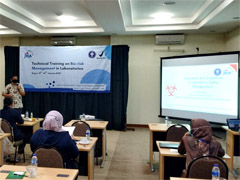 Dr Budiman Bela facilitated understanding on regulatory framework for biorisk management.
Dr Budiman Bela facilitated understanding on regulatory framework for biorisk management.
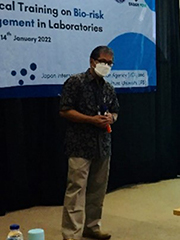 Dr Drh Joko Pamungkas overviewed the principles on biosafety and biosecurity required in laboratory environment.
Dr Drh Joko Pamungkas overviewed the principles on biosafety and biosecurity required in laboratory environment.
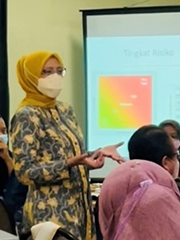 Dr Drh Diah Iskandriati emphasized the importance on consideration of both likelihood of risks and their levels of consequences in risk assessments.
Dr Drh Diah Iskandriati emphasized the importance on consideration of both likelihood of risks and their levels of consequences in risk assessments.
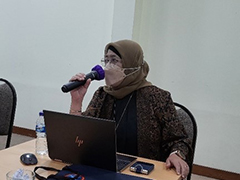 Dr. Drh. Susan M Noor introduced necessary practices in animal laboratories.
Dr. Drh. Susan M Noor introduced necessary practices in animal laboratories.
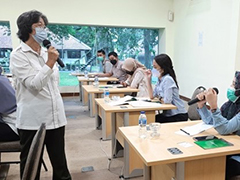 Drh. Indrawati Sendow stressed the importance of repeated practical training in decontamination and waste management to prevent laboratory-acquired infection.
Drh. Indrawati Sendow stressed the importance of repeated practical training in decontamination and waste management to prevent laboratory-acquired infection.
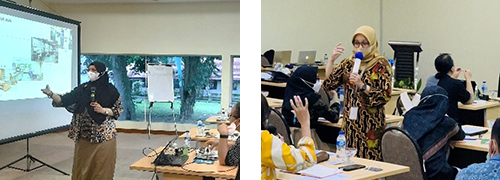 Ms Ida Susanti (left) and Dr Silmi Mariya (right) focused on laboratory facility and equipment to support laboratory bio-risk management.
Ms Ida Susanti (left) and Dr Silmi Mariya (right) focused on laboratory facility and equipment to support laboratory bio-risk management.
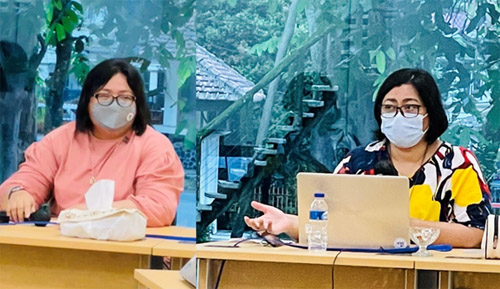 dr Ni Ketut Susilarini (left) and Dr Aroem Naroeni DEA (right) explained about critical points on ocupational health and safety, and on decontamination and waste management. They also supervised in demonstration of bio spill clean-up procedures using a basic biological spill kit.
dr Ni Ketut Susilarini (left) and Dr Aroem Naroeni DEA (right) explained about critical points on ocupational health and safety, and on decontamination and waste management. They also supervised in demonstration of bio spill clean-up procedures using a basic biological spill kit.
 Bio spill clean-up procedures using disinfectants.
Bio spill clean-up procedures using disinfectants.
Donning & doffing personal protective equipment (PPE) and personal hygiene.
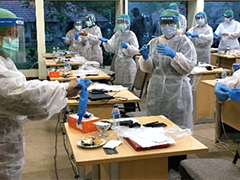 Removing PPE after application of fluorescent lotion on gloves.
Removing PPE after application of fluorescent lotion on gloves.
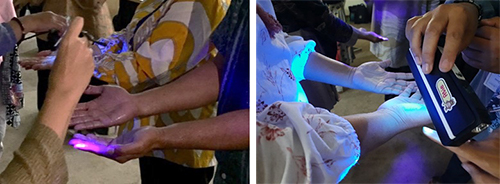 Checking if the lotion is detected on hands and body.
Checking if the lotion is detected on hands and body.
Visualization is useful to see prevention of contamination with potentially infectious materials.
Laboratory visits
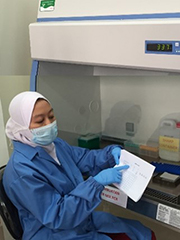 Ms Reza Kristiyana, giving instructions on the use of biosafety cabinet at the BLS 2 laboratory.
Ms Reza Kristiyana, giving instructions on the use of biosafety cabinet at the BLS 2 laboratory.
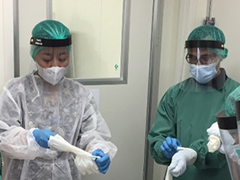 Drh Ni Luh Putu Ika Mayasari and drh Supriyono, giving instructions on how to enter and leave BSL 3 laboratory.
Drh Ni Luh Putu Ika Mayasari and drh Supriyono, giving instructions on how to enter and leave BSL 3 laboratory.
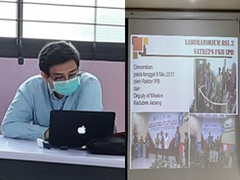 Dr drh Ronald Tarigan introduced the BSL 3 laboratory of the Faculty of Veterinary Medicine in IPB University.
Dr drh Ronald Tarigan introduced the BSL 3 laboratory of the Faculty of Veterinary Medicine in IPB University.
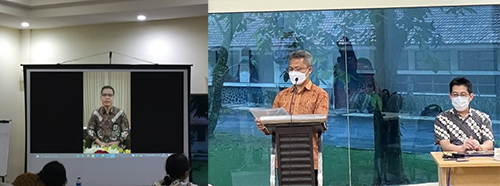 Closing session. (Center)Prof. Drh. Deni Noviana, Ph.D, DAiCVM, Dean of Faculty of Veterinary Medicine, IPB University, (left) Mr Mohamad Kashuri, S.Si., Apt., M.Farm,Head of PPPOMN, Badan POM, and (right) Mr Yoshihiko Sano, Chief Advisor JICA Project Office Indonesia are present.
Closing session. (Center)Prof. Drh. Deni Noviana, Ph.D, DAiCVM, Dean of Faculty of Veterinary Medicine, IPB University, (left) Mr Mohamad Kashuri, S.Si., Apt., M.Farm,Head of PPPOMN, Badan POM, and (right) Mr Yoshihiko Sano, Chief Advisor JICA Project Office Indonesia are present.
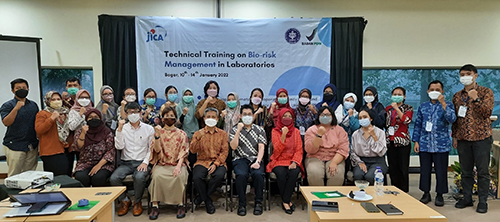 Group photo session.
Group photo session.
Note
- [1] 20 laboratory scientists from:
- PPPOMN of Badan POM,
- Balai Besar POM in Medan, Semarang, Banjarmasin, Pekanbaru, Palangka Raya, Samarinda, Bandar Lampung, Banda Aceh and Jayapura. and
- Balai POM in Tarakan, Manokwari, Kupang, Sofifi, Mamuju, Pangkalpinang, Bengkulu, and Palu.
- About JICA
- News & Features
- Countries & Regions
- Our Work
- Thematic Issues
- Types of Assistance
- Partnerships with Other Development Partners
- Climate Change / Environmental and Social Considerations
- Evaluations
- Compliance and Anti-corruption
- Science and Technology Cooperation on Global Issues
- Research
- JICA Development Studies Program / JICA Chair
- Support for the Acceptance of Foreign HRs / Multicultural and Inclusive Community
- Publications
- Investor Relations
